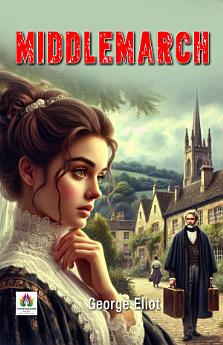Middlemarch by George Eliot: A masterpiece of realism, love, and societal change.
About this ebook
The narrative structure of *Middlemarch* is notable for its depth and complexity, weaving together the lives of multiple characters as they navigate the challenges of love, ambition, and societal expectations. At the heart of the story is the intelligent and ambitious Dorothea Brooke, whose desire for a meaningful life leads her to make choices that reflect both her aspirations and the constraints placed on women of her time. Dorothea's journey, marked by her marriage to the aging scholar Casaubon, serves as a lens through which the novel examines themes of idealism, disillusionment, and the search for true purpose.
One of the most compelling aspects of *Middlemarch* is its exploration of female autonomy and the limited opportunities available to women in the 19th century. Dorothea, with her idealistic views and quest for intellectual companionship, contrasts sharply with societal expectations that dictate marriage and domesticity. As she navigates her relationships, readers witness her growth and struggles, highlighting the poignancy of her character arc. Through Dorothea's experiences, Eliot questions the constraints of gender roles and the societal structures that impede personal growth and fulfillment.
Alongside Dorothea, the novel presents a vast array of characters whose lives intersect in various ways. Among them are Dr. Tertius Lydgate, a passionate physician eager to reform medicine but ultimately thwarted by his ambitions and societal conflicts; Rosamond Vincy, Lydgate's beautiful yet self-absorbed wife, representing the contradictions of desire and ambition; and Mr. Brooke, Dorothea’s father, whose careless handling of wealth and status provides a critique of the idle gentry.
Eliot’s insightful characterizations reveal the nuances and complexities of human relationships, painting a vivid portrait of provincial life. Each character represents distinct aspects of society—from the idealists to the pragmatists, from the morally earnest to the ambitious and self-serving. Through rich details and intricate interactions, Eliot unpacks the motivations and desires that drive her characters, allowing readers to explore the moral and ethical dilemmas of their choices.
The novel also reflects the socio-political climate of the time, touching on issues such as reform, the rise of the middle class, and the struggles for social justice. Eliot's keen observations of society allow her to explore the interconnectedness of personal lives with larger social movements, as the characters grapple with the changing dynamics of their world. Through Lydgate's aspirations and disillusionments, the novel comments on the challenges of implementing social change and the consequences of personal ambition in a rigidly structured society.
Moreover, *Middlemarch* is lauded for its rich narrative style and philosophical depth. Eliot's prose is characterized by her intellectual rigor and psychological insight, presenting a compelling exploration of the human condition. Her use of free indirect discourse allows readers to glimpse the inner thoughts of her characters, creating an intimate connection with their struggles. This narrative technique enhances the emotional weight of the story, inviting readers to reflect on their own lives and the complexities of moral decision-making.
In the conclusion of *Middlemarch*, Eliot emphasizes the idea of persevering in the face of life's challenges. The characters’ journeys culminate in varying degrees of resolution, reminding readers that while grand aspirations may often lead to disappointment, the quieter, more mundane aspects of life hold their own significance. This perspective invites readers to appreciate the everyday struggles and victories of individuals, reinforcing the idea that lives of quiet significance are often the most profound.
In summary, *Middlemarch* is a masterful exploration of the intricacies of human relationships, societal change, and the search for meaning. George Eliot's profound insights, complex characterizations, and exploration of gender and class render this novel a timeless classic. Through the lives of Dorothea, Lydgate, and others, *Middlemarch* invites readers to reflect on the complexities of ambition, the nature of love, and the consequences of individual choices within the broader fabric of society. Its enduring relevance and rich narrative make it a cornerstone of Victorian literature.







